The 1st International Workshop on “Designing with and for People with Intellectual Disabilities”
At ASSETS 2022 – The 24th International ACM SIGACCESS Conference on Computers and Accessibility
An online event with asynchronous and synchronous activities on October 19th, 2022, from 9am to 1pm Athens time
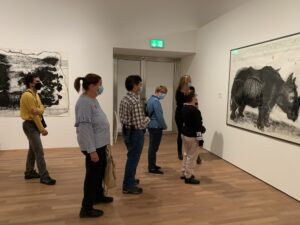
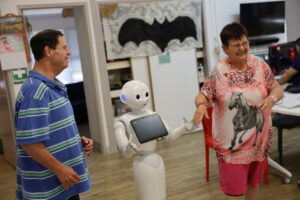
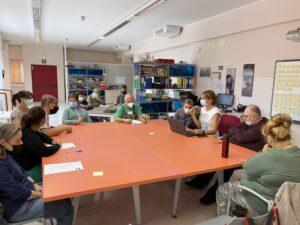
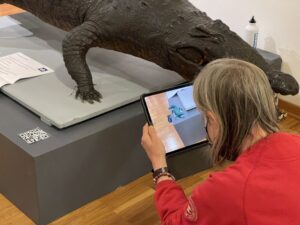
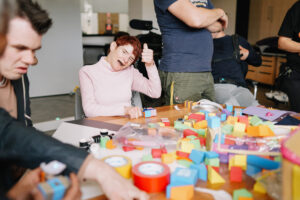
Call for Participation
This half-day workshop aims to focus on community building, enabling researchers to share experiences on how to design for and with people with Intellectual Disabilities, provide internal support, and establish new collaborations. Our pre-workshop plans propose asynchronous activities to support networking and to understand participants’ preferences and needs. Workshop outcomes will help fill a gap in the available guidelines on including people with intellectual disabilities in research, which should lead to more accessible protocols and personalised and better fit-for-purpose technologies.
Areas of interest for the workshop include, but are not limited to, the following topics:
- Verbal and non-verbal communication (e.g., language, AAC, signals, feedback)
- Methods for working with participants (e.g., experience reports, co-design, focus groups, scaffolding, active support)
- Design and development of hardware and software (e.g., inclusive applications, assistive technology, multisensory experiences, AR/VR)
- Assessment techniques (e.g., cards, multiple choices, open-ended questions, satisfaction surveys)
We are pleased to announce that this workshop is open to everyone interested in the topic, regardless of experience and expertise level. Participants will be able to apply in multiple ways:
- Filling in a form expressing interest
- Sending an abstract (150 words) by e-mail
- Submitting an experience report via video (5-minute maximum), text, or audio (.mp3, .mp4, .m4a, .wav, .aac) by e-mail*
*Please, to exhibit the experience reports in the workshop, we kindly ask you to include subtitles and upload them into one video-sharing platform as not listed. Keep in mind that the requirement is that at least one author of each accepted submission must register for and attend the workshop.
Thank you,
The DPID Workshop Organizing Committee 2022
Important Dates
- Submission Deadline:
Friday, Sep 23th at 11:59PM AoE (Anywhere on Earth Time Zone) - Acceptance Notifications:
Wednesday, Sep 28th - Asynchronous Activities Period: Monday, Oct 3rd – Friday, Oct 14th
- Synchronous Workshop Date: Wednesday, Oct 19th
Workshop Structure
We propose a half-day workshop. To accommodate different time zones and needs, we plan to have a 4-hour synchronous session (from 9 am to 1 pm Athens time) on the day of the workshop and asynchronous activities to meet participants, provide materials, and network before the event. Afterward, we expect to have a report on the outcomes of the workshop and keep connected with the participants in an online channel, fostering research collaboration.
Here are the details of the expected workshop synchronous schedule:
- Opening and Introductions – 30 minutes. The organisers will outline the goals of the workshop, including the agenda for the day. Participants will then have the opportunity to remind each other of their own background, and motivations for taking part. Note that initial introductions will occur in the pre-workshop activities;
- Keynote + Questions – 30 minutes. We are delighted to announce Dr. Margot Brereton as our keynote speaker. We will have a 20-minute presentation session, followed by 10 minutes of Q&A (Questions and Answers) from our participants;
- Break – 10 minutes. A 10-minute comfort break will be provided for our participants;
- Experience Reports – 40 minutes. This session will exhibit the experience reports submitted by the workshop participants during their expression of interest, along with the materials developed by the organisers with our target group. These reports may include various formats such as audio, video, and, text, meaning the organisers will be in touch with participants in advance to agree on the best style of presentation. For example, captioned video submissions could be replayed verbatim, whereas a PowerPoint presentation may be needed to replace a textual submission. The resources produced during this session should help other researchers gain a deeper understanding of the needs, and preferences of people with ID in human-computer interaction research;
- Break – 10 minutes. Another 10-minute break will be provided for our participants;
- Breakout rooms – 50 minutes. The group of participants will be divided into breakout rooms, based on everyone’s submissions and interests. The purpose is to discuss different topics relating to the design of technologies in a more intimate session. At least one organiser will be available in each room to serve as a facilitator and note-taker and to create discussion points that provoke conversation;
- Break – 10 minutes. The last 10-minute break will be provided for our participants;
- Reflection and Closing Remarks – 1 hour. The final session will summarise the findings from the breakout rooms, with the participants agreeing on the design considerations and practices that should be shared with the wider academic community. Lastly, we will identify opportunities for further dialogue and collaboration beyond the workshop.
Keynote
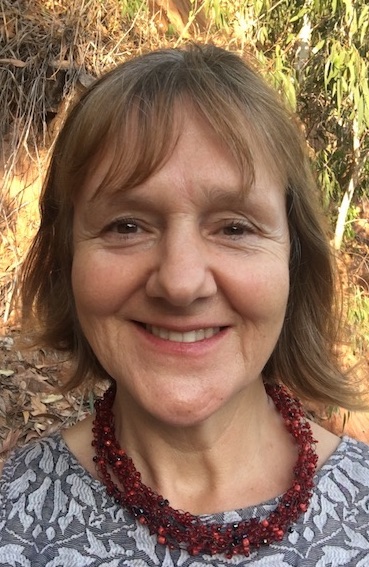
How might we design with and for people with intellectual disabilities?
People with intellectual disabilities are often avid users of technologies, with, like all of us, preferences for those that suit them best. How can we learn from them about their technology use, and how to better design technologies with them? I will briefly describe some interactional approaches in research that have failed and that have worked, based upon our work with young adults with intellectual disabilities, and minimally verbal first grade children on the Autism spectrum. Based on this, I will advocate for exploratory, collaborative design approaches that focus on agency, mediating technologies and matters of care. This then opens the door to a variety of challenges to be discussed!
Margot Brereton researches the co-design of new humanitarian technologies and their interfaces. She is a Professor of Engineering and Interaction Design in the School of Computer Science at the Queensland University of Technology. She co-designs with real user communities whose needs are typically overlooked in technology development. She has focused on better futures for and the agency of older people, neurodiverse people, minimally-verbal children with Autism, connecting people to nature, and fostering use of endangered indigenous languages. Margot works with particular communities in long term engagements over several years to ensure that designs fit into people’s lives in positive ways with people shaping their evolution. Margot’s approach, which focuses on tangibles, connected interfaces, AI and machine learning technologies, leads to innovative designs and new theoretical understandings and methods in the field of Human-Computer Interaction. Margot began her career as an apprentice at Rolls Royce aircraft engines. She holds a PhD in Mechanical Engineering Design from Stanford University, a Masters in Technology Policy from Massachusetts Institute of Technology and a BSc.Eng(Hons) from University of Bristol, UK. Her approach has been greatly influenced by the social sciences and anthropology and is best described as exploratory co-design research.
Organizers
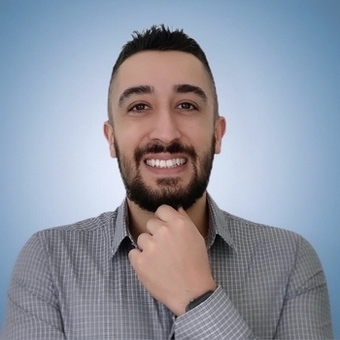
Leandro Soares Guedes is a Research Assistant and Ph.D. student at USI (Switzerland) and an assistant professor at IFMS (Brazil).
His current doctoral project involves People with ID in the Museum context, seeking to enhance their user experience into three branches: Augmented Reality, Accessible Applications, and Multisensory Experiences. He is mainly interested in Human-Computer Interaction, Accessibility, User Experience, Inclusion, and Education.

Ryan Colin Gibson is a postdoctoral Research Fellow in Computer Security in the Department of Computer and Information Sciences, University of Strathclyde.
His main research interests lie in the design and evaluation of accessible technologies for vulnerable populations, with a particular focus on intellectual disability. His Ph.D. work on “Designing Clinical AAC Tablet Applications with Adults who have Mild Intellectual Disabilities” received a Best Paper Award at CHI’2020.
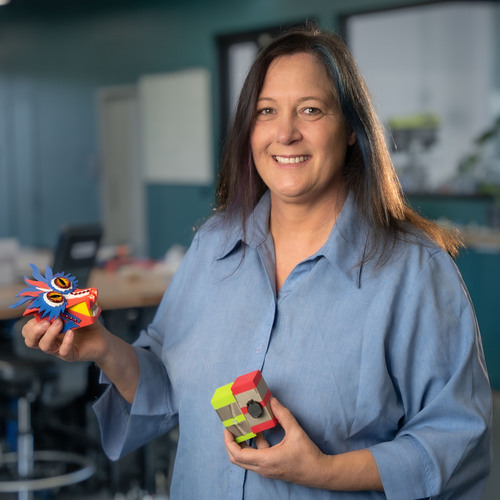
Kirsten Ellis leads the Inclusive Technology Lab at Monash University in the Faculty of Information Technology.
She is working with the community to use cutting edge technology to solve real-world problems for people living with a disability. Her current research focuses on optimising creative technology engagement opportunities for people with Intellectual Disabilities.
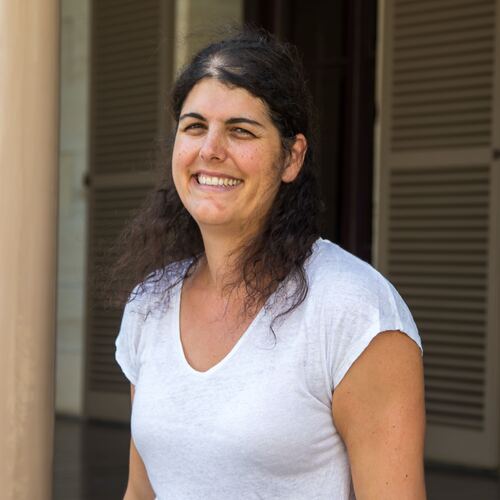
Laurianne Sitbon is a Future Fellow of the Australian Research Council (ARC), and associate professor in the school of Computer Science at the Queensland University of Technology (QUT) in Brisbane, Australia.
Her research expertise spans human computer interactions (with a focus on co-design and cognitive accessibility), natural language processing (with a focus on semantics), and information retrieval. She has conducted and supervised research through co-design with people with intellectual disability to guide the design of information access technologies and their potential to support inclusion through visual communication.

Monica Landoni is the leader of the Laboratory of User Experience, Interaction & Accessibility, LUXIA at the faculty of Informatics at Università della Svizzera Italiana (USI).
She has worked on several national and European projects investigating how technology can support user groups with special needs when searching, writing, and reading for education and pleasure. While doing that, she has happily designed and conducted many collaborative design sessions in formal and informal settings, carefully taking into account the needs, requests, roles, and points of view of varied stakeholders.